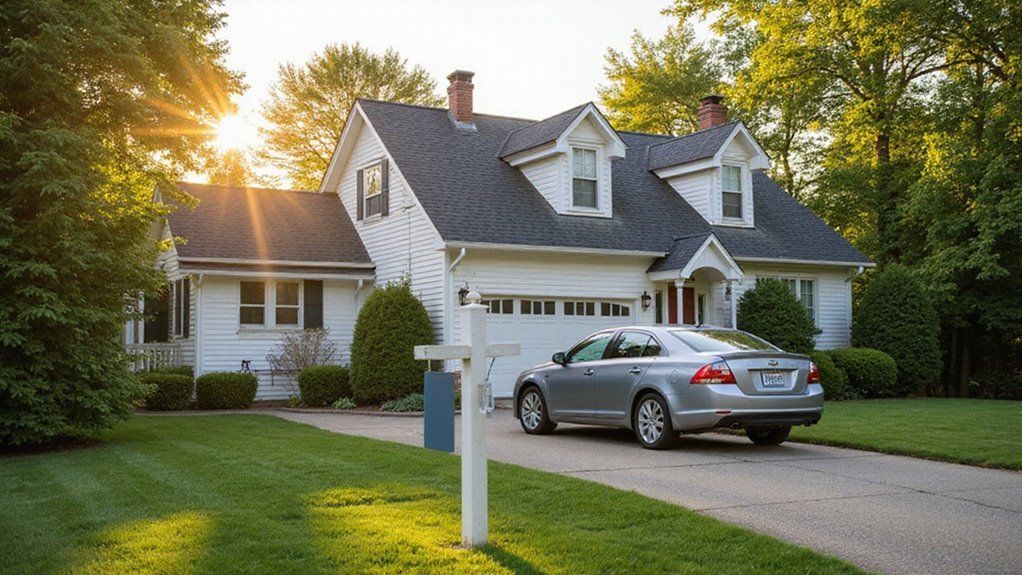Can You Sell a House With a Mortgage?

Mortgage paperwork doesn’t need to stand between you and selling your dream home. Many homeowners face uncertainty when selling property with outstanding loans, creating stress during an already complex transaction. Navigating this process strategically can transform a potential headache into a straightforward financial transition.
Yes, you can absolutely sell a house with a mortgage. The mortgage gets paid off during closing using your sale proceeds. Your lender provides a payoff statement detailing the exact amount needed to settle the debt.
In this blog I will explore everything you need to know about selling a home with an existing mortgage.
Key Takeaways
- Yes, you can sell a house with an existing mortgage; the loan must be paid off at closing.
- A mortgage payoff statement from the lender is required before transferring ownership.
- Sale proceeds are used to settle the mortgage balance, with remaining funds going to the seller.
- The sale must comply with lender and legal requirements, including satisfying the mortgage before title transfer.
- Proper planning and understanding of closing costs ensure a smooth sale process with a mortgage.
Can You Sell a House with a Mortgage?

Yes, you can sell a house with an existing mortgage. The sale proceeds first go toward paying off your current loan balance.
Oklahoma law requires all mortgages to be satisfied before title transfer can occur. You’ll need to request a mortgage payoff statement from your lender before closing. This document shows the exact amount needed to clear your debt.
During closing, the title company handles the mortgage payoff process. Your buyer’s funds cover your remaining balance.
For instance, if your home sells for $300,000 with a $180,000 mortgage, you’ll receive roughly $120,000 minus closing costs.
What Happens to Your Mortgage When Selling?

When you sell your home, you must pay off your existing mortgage at closing, ensuring the lender receives the full remaining balance.
Understanding the difference between your remaining loan amount and sale proceeds helps you gauge your net profit or debt.
To do this efficiently, you’ll need a mortgage payoff statement that outlines the exact payoff amount, including interest and fees.
Paying Off the Existing Loan
Yes, you must pay off your current mortgage to sell your Tulsa property. Request a payoff statement from your lender first. This document shows the exact amount needed to clear your debt.
Make sure you have enough funds to cover the total payoff amount. Your payoff will include the remaining balance plus interest and any applicable fees.
The mortgage must be fully satisfied before ownership transfers to the new buyer.
Your closing agent will handle the payment process during settlement. They’ll ensure all mortgage obligations are cleared using proceeds from the sale.
Understanding Remaining Balance vs. Sale Proceeds
The remaining balance is what you still owe on your mortgage while sale proceeds are what you receive after selling your home.
When you sell your house in Tulsa, the money from the sale first pays off your mortgage balance plus any interest and fees.
If your sale proceeds exceed your loan balance, you’ll receive the difference as profit.
However, if your sale proceeds aren’t enough to cover the loan, you might need a short sale. In some cases, foreclosure becomes necessary.
The financial outcome depends on your property’s current value compared to your outstanding mortgage debt.
This understanding helps you make informed decisions about selling your home.
Mortgage Payoff Statement Explained
A mortgage payoff statement shows the exact amount needed to completely pay off your loan. It includes your remaining loan balance, accrued interest, and any closing fees.
The statement typically lists all fees, penalties, and the final payoff amount valid through a specific date.
Lenders calculate interest daily, so timing matters. Your statement provides peace of mind by preventing underpayment issues that could delay your closing.
You should request this document from your lender at least 2-3 weeks before your intended payoff date.
Additionally, this information helps everyone involved understand the financial requirements clearly.
How Does Selling a House with a Mortgage Work?

To sell a house with a mortgage, you first need to assess your finances and determine how much you owe versus your home’s value.
Next, you’ll list and market the property, ensuring you understand the closing process and how the sale proceeds will be distributed—to pay off the mortgage and cover fees.
Once the sale closes, the lender’s payoff amount is settled, and any remaining funds go to you.
Pre-Sale Financial Assessment
Evaluate your financial position before listing your home for sale. Check your mortgage balance to know your exact equity. Compare current market values with what you still owe. Remaining mortgage debt should be less than your expected sale price.
Your sale will incur closing costs and potential fees. These typically include agent commissions, transfer taxes, and title insurance. Closing expenses often range from 8-10% of the sale price.
Additionally, consider whether you’ll need these funds for your next home purchase.
This financial clarity prevents surprises and positions you to make confident decisions. With proper assessment, you can set realistic pricing and timeline expectations.
Listing and Marketing the Property
Create an accurate listing that showcases your home’s best features. High-quality photos and detailed descriptions attract more potential buyers to your property. Your listing should include correct measurements, recent upgrades, and unique selling points.
Effective marketing extends beyond online listings. Consider holding open houses and utilizing social media to reach more buyers. Properties with professional photographs sell 32% faster than those with amateur photos. Many homeowners find success through virtual tours.
The goal is to attract qualified buyers who can meet your asking price. Clear communication about your property’s condition builds trust with potential buyers. This transparency helps avoid complications during the inspection and negotiation phases.
Closing Process and Fund Distribution
The closing process finalizes your home sale with careful fund distribution. You must get a payoff statement from your mortgage company first.
Your lender requires full payment before releasing their claim on your property. The title can’t transfer until this happens.
Money from the sale covers your remaining loan balance. Additional funds pay real estate commissions and closing costs. Whatever remains becomes your proceeds from the sale.
Furthermore, the settlement agent handles these transactions. They ensure everyone receives correct payment according to the closing documents.
What Are the Financial Implications?
When you sell your home with a mortgage, understanding your equity, closing costs, and powerful taxes is crucial for accurate financial planning.
You’ll need to calculate your net profit after paying off the loan and deducting fees, which can impact your overall gain.
Additionally, knowing tax implications helps you avoid surprises and maximize your benefits from the sale.
Equity Calculation and Potential Profits
Home equity equals your sale price minus your mortgage balance. This difference represents your potential profit when selling. Your current mortgage balance compared to expected sale price determines available funds.
Closing costs will reduce this amount further. You must account for all expenses before knowing your true profit.
Estimated closing costs typically range from 6-10% of the sale price. These include agent commissions, transfer taxes, and attorney fees.
The final calculation reveals what you’ll actually take home. After paying off your mortgage and covering all selling expenses, the remainder becomes your profit. This figure helps you plan your next purchase or investment.
Dealing with Closing Costs and Fees
Sellers must budget for 8-10% of the sale price in closing costs. These typically include agent commissions of 5-6% and various settlement fees.
You need an accurate mortgage payoff statement from your lender before listing. This document shows the exact amount needed to clear your loan completely.
The final payoff amount often includes interest through the closing date and potential prepayment penalties. Smart sellers request this statement early to avoid surprises at closing time.
Your net proceeds equal the sale price minus your mortgage balance and all closing costs.
Remember to factor in transfer taxes and title insurance costs when calculating your final numbers.
Tax Considerations When Selling
Homeowners in Oklahoma can minimize tax burdens when selling property.
Federal tax law allows up to $250,000 in tax-free profits for singles and $500,000 for married couples filing jointly. This applies only to primary residences you’ve owned for at least two years.
Your profit calculation starts with the sale price minus your original purchase cost and improvements.
Furthermore, Oklahoma doesn’t impose additional state taxes on real estate capital gains. The IRS requires documentation of all housing-related expenses.
In most cases, closing costs reduce your taxable profit amount. However, these benefits don’t apply to investment properties or second homes.
Can You Sell If You’re Underwater on Your Mortgage?
If you’re underwater on your mortgage, selling your home becomes more complex but still possible through options like a short sale or negotiating with your lender.
You can investigate foreclosure alternatives if you qualify, but you’ll need lender approval and proper documentation.
Understanding these strategies helps you make informed decisions and avoid unnecessary legal or financial risks.
Short Sale Options
A short sale allows you to sell your home for less than what you owe on the mortgage. This option requires lender approval but helps avoid foreclosure if you’re underwater. Oklahoma law permits short sales when you can’t afford your mortgage payments.
Your lender must approve both the sale and the reduced payoff amount. Complete documentation is necessary for the transaction to close successfully.
The difference between your mortgage balance and the sale price might be forgiven. Short sales impact your credit less severely than foreclosures.
Additionally, they provide a clean break from an unaffordable property. Consider consulting with a real estate professional who specializes in distressed properties.
Foreclosure Alternatives
Several options exist to help homeowners avoid foreclosure. A short sale lets you sell your home for less than you owe with lender approval. This provides a path to resolve mortgage debt without completely losing your property.
Lenders may forgive the remaining balance after a short sale in some situations.
Loan modifications can also change your payment terms to make them more affordable. Forbearance temporarily pauses or reduces payments during financial hardship.
Additionally, deed-in-lieu arrangements allow you to transfer ownership directly to the lender.
Each option has different credit impacts and qualification requirements. Early communication with your lender opens more possibilities.
Negotiating with Lenders
When your home value drops below your mortgage, you must talk to your lender. Request a mortgage reduction or explore a short sale option with their approval.
Present clear documentation of your financial hardship. Lenders need to understand why you can’t pay the full amount. A feasible repayment plan increases your chances of approval by 60%.
Additionally, ask about loan modifications that might work for your situation.
Open communication serves both your interests. The lender wants to minimize losses while you need to sell your home. This approach creates a smoother process for everyone involved.
What About Special Mortgage Situations?
If you have an FHA, VA, or USDA loan, there are specific requirements you must meet to sell your home.
These programs often require full payoff, property standards, or lender approval before transferring the title.
Understanding these unique rules helps ensure a smooth sale without legal or financial setbacks.
FHA Loans Considerations
FHA loans require specific steps when selling your Tulsa home. Your property must pass HUD inspection standards before any sale can proceed.
All FHA loans must be completely paid off during the closing process. You’ll need to obtain proper mortgage release documentation from your lender.
The inspection focuses on safety, security, and soundness of the property structure.
FHA payoff procedures often require extra paperwork compared to conventional loans. Request your payoff statement early to avoid delays.
Mortgage release forms prove you’ve satisfied all loan obligations. Start gathering these documents well before listing your home.
This preparation helps ensure a smooth transaction for both you and your buyer.
VA Loan Requirements
VA loans require full mortgage payoff before any property sale completes. The lender must receive complete payment to release their lien on the property. Without this release, you can’t legally transfer the title to a new owner.
Federal regulations strictly mandate that all VA loans must be satisfied at the time of sale. This protects all parties involved in the transaction. The lending institution will provide payoff instructions when you’re ready to sell.
Furthermore, these requirements ensure clean title transfers and prevent future legal complications.
Military service members benefit from these clear guidelines during their homeownership journey.
USDA Loan Restrictions
USDA loans require full payoff before property transfer. You must pay the complete loan balance when selling a home with a USDA loan.
The lender needs to release all property liens before closing can occur.
USDA approval is mandatory for all property sales under their mortgage program.
Complete loan payoff must happen at closing. All property liens must be cleared before ownership transfers.
These requirements protect both the USDA program and future buyers. Following these guidelines ensures a smooth transaction that complies with federal regulations.
Always inform potential buyers about these restrictions early in the selling process.
How to Sell Your House Fast with an Existing Mortgage
To sell your house quickly with an existing mortgage, focus on preparing your home for a fast sale and setting a competitive price.
Working with cash buyers can streamline the process and reduce delays, but you’ll need to gather all necessary documentation, like payoff statements and title transfer paperwork.
Being organized and strategic ensures a smooth transaction and helps you close faster.
Preparing Your Home for Quick Sale
Sell your home quickly by focusing on three key areas. Create strong curb appeal with fresh paint, neat landscaping, and clean walkways. First impressions matter most to potential buyers. Remove personal items and excess furniture to make rooms appear larger.
Next, tackle small repairs that buyers notice immediately. Fix leaky faucets, patch wall holes, and replace broken fixtures right away. These improvements show your home is well-maintained.
Finally, price your home competitively based on recent neighborhood sales. A clean, well-staged home with the right price point attracts serious buyers.
Meanwhile, contact your mortgage lender to understand your payoff amount.
Setting the Right Price
Price your house based on its current market value to sell quickly with a mortgage. Professional appraisals provide accurate value assessments that attract serious buyers. This strategy helps ensure you’ll cover your remaining mortgage at closing.
Too high a price deters potential buyers, while pricing too low leaves money on the table. A competitive price creates interest and can lead to faster offers.
Moreover, accurate pricing reduces the risk of appraisal issues during the financing process.
For best results, consider recent comparable sales in your neighborhood. Additionally, factor in any unique features or improvements that add value to your property.
Working with Cash Home Buyers
Cash home buyers provide a fast selling option when you have an existing mortgage. These buyers purchase houses directly with cash, avoiding traditional financing delays.
The process typically closes within 7-14 days rather than the standard 30-45. Your mortgage will be paid off during closing from the sale proceeds. Additionally, cash transactions require minimal paperwork compared to traditional sales.
Furthermore, cash buyers often purchase properties “as-is,” eliminating the need for repairs or staging.
Most cash buyers can close in as little as 7 days once a title search confirms no liens exist. This approach works well for homeowners facing foreclosure or needing to relocate quickly.
Required Documentation and Paperwork
You need several key documents to sell a mortgaged house. A payoff statement shows the exact amount needed to clear your loan. The executed deed legally transfers ownership to the buyer. Your settlement statement itemizes all costs associated with the closing process.
Mortgage lenders require a formal release document to remove their claim on your property.
The HUD-1 form may be necessary for certain transactions under federal regulations. These papers ensure a clean title transfer and accurate financial settlement.
Always gather these documents early in the selling process. In most cases, your closing agent will help obtain the necessary paperwork.
Sell Your Home with Confidence to Tulsa Home Buyers
Tulsa Home Buyers offer reliable, straightforward home purchase services. We buy properties in any condition without inspections or repairs. Our process eliminates realtor commissions and closing costs.
Oklahoma law requires sellers to disclose property defects and complete accurate transfer paperwork. You’ll need clear title after paying off any existing mortgages.
We handle these legal requirements for you.
The typical transaction takes just 7-14 days from agreement to closing. Most importantly, you receive cash payment at closing with no unexpected delays or financing contingencies.
Local market knowledge allows us to make fair offers based on current Tulsa property values.
Frequently Asked Questions
Can I Sell My House Before Paying off the Mortgage?
Yes, you can sell your house before paying off the mortgage. Ensure you obtain a payoff statement from your lender, pay the remaining balance at closing, and follow Oklahoma laws to transfer the title legally.
What Are the Risks of Selling With an Outstanding Mortgage?
You risk the sale falling through, legal penalties, or liens if you don’t pay off your mortgage before closing. Always obtain a payoff statement, ensure full repayment, and follow Oklahoma laws to protect your transaction and reputation.
How Long Does It Take to Close After Selling a Mortgaged Property?
Closing usually takes 30 to 45 days, like turning a well-oiled machine. You’ll coordinate with your lender, complete paperwork promptly, and ensure the mortgage payoff is settled, so the sale proceeds smoothly for everyone involved.
Are There Penalties for Paying off My Mortgage Early During Sale?
You generally won’t face penalties for paying off your mortgage early during a sale, especially if it’s a standard loan. Check your lender’s terms to confirm, as some loans, like certain FHA or VA, might have prepayment fees.
Do I Need Lender Approval to Sell a House With a Mortgage?
Consider your mortgage as a bridge; you must get approval from your lender before crossing. You need lender approval or payoff confirmation to sell, ensuring a smooth transfer of ownership without legal or financial obstacles.
Ready to work with Tulsa Home Buyers?
Let's connect! We’re here to help.
Send us a message and we’ll be in touch.
Or give us a call today at (918) 516-8951


